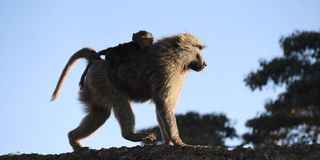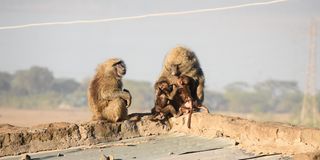How baboon mums selflessly care for their young and the entire troop

A female baboon carries its child on a roof in Nakuru's Free Area estate.
Baboon mothers intrigue me in how they interact with their young.
It’s interesting to watch them swing from one tree to another with their babies gripped on or under them at Lake Nakuru National Park.
More interesting is how at times they discipline their children like all mothers in the animal kingdom.
According to the Kenya Wildlife Service Nakuru County Warden, Cheruiyot Chepkwony, a baboon mother has a special place in the troop.
“Their role doesn’t stop at giving birth. Baboon mothers are the providers. Each gets to fend for the young ones and the entire troop while the males dominantly protect the family from any invasion,” he reveals.
Needless to say in the absence of the male, he says baboon mothers are known to charge aggressively to protect the infants.

Baboons from Lake Nakuru National Park repeatedly invade homes near the park.
Female baboons have a lifespan stretching 20 to 30 years.
However, their life cycle can be shorter if they are actively involved in altercations with other baboons from other troops as they try to defend their infants, therefore ending in death.
“Baboon mums put themselves in the line of danger and at times deprive themselves food during the dry season so that their offspring can get enough. Consequently, some of these mothers live shorter lives than their male counterparts," he explains.
Mr Chepkwony further notes, that baboon mothers are compassionate.
“Ever seen how a baboon grooms its infant? It meticulously checks for any invasive parasite that can be seen from the surface as they clean their young ones."
The county warden says that it's common to see a troop with many infants as the gestation period for baboons is a little under six months. They mostly give birth to a single offspring.
“Only in rare occasions would they give birth to twins,” he concludes.

